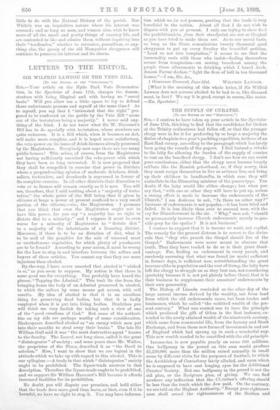LETTERS TO THE EDITOR.
SIR WILFRID LAWSON ON THE VETO BILL.
[To THE EDITOR 01, THE " SPECTATOR:]
Sin,—Your article on the Hyde Park Veto Demonstra- tion, in the Spectator of June 17th, charges the demon- strators with being illogical and with having no "moral basis." Will you allow me a little space to try to defend these unfortunate persons and myself at the same time? As to myself, you say that I intimated that the right" pro- posed to be conferred on the public by the Veto Bill "arose out of the teetotalers being a majority." I never said any- thing of the kind. I do not know what Sir W. Harcourt's Bill has to do specially with teetotalers, whose numbers are quite unknown. It is a Bill which, when it becomes an Act, will make more complete, and it is hoped more satisfactory, the veto-power on the issue of drink-licences already possessed by the Magistrates. Everybody now says there are too many public-houses ! This arises, of course, from the Magistrates not having sufficiently exercised the veto-power with which they have been so long entrusted. It is now proposed that they shall be compelled to exercise that power in districts where a preponderating opinion of moderate drinkers, drink- sellers, teetotalers, and drunkards is expressed in favour of its complete exercise. In all other districts their discretion to veto or to license will remain exactly as it is now. You will see, therefore, that I said nothing about a "majority of teeto- talers," the whole point of the Bill being that it gives to citizens at large a power at present confined to a very small portion of the citizens,—viz., the Magistrates. I presume that you think that even the Magistrates ought not to have this power, for you say "a majority has no right to dictate diet to a minority ;" and I suppose it must be even worse for a minority of Magistrates to " dictate diet" to a majority of the inhabitants of a licensing district. Moreover, if there is to be no dictation of diet, what is to be said of the penalties for the sale of unsound meat or unwholesome vegetables, for which plenty of purchasers are to be found ? According to your axiom, it must be wrong for the Law to step in and interfere between the sellers and buyers of these articles. You cannot say that they are more injurious than alcohol.
By-the-way, I have never asserted that alcohol is "wicked in se," as you seem to suppose. My notion is that there is some good use for everything. You probably have heard the phrase, "Tapping the Admiral." This took its rise from the bringing home the body of an Admiral preserved in alcohol, to which the sailors by some means got access, with evil results. My idea of alcohol is that it is an excellent thing for preserving dead bodies, but that it is badly employed when it is put into living bodies. Doubtless you will think me very foolish for taking such a view of one of the "good creations of God." But some of the authori- ties on my aide are perhaps worthy of some consideration. Shakespeare described alcohol as " an enemy which men put into their mouths to steal away their brains!' The late Sir William Gull said it was "the most destructive agent" known to the faculty. The Lancet, not long since, called it the great " disintegrator " of society ; and some years since Mr. Walter, the proprietor of the Times, described it as "the Devil in solution." Now, I want to show that we are logical in the attitude which we take up with regard to this alcohol. This is our syllogism :—A trade in that which" disintegrates" society ought to be prohibited. The liquor-trade answers to that description. Therefore the liquor-trade ought to be prohibited, and we support Sir William Harcourt's Bill because it affords increased facilities for its prohibition.
No doubt you will dispute our premises, and hold either that the trade does more good than harm, or that, even if it be harmful, we have no right to stop it. You may have informa-
tion which we do not possess, proving that the trade is very beneficial to the nation. About all that I do not wish to dispute with you at present. I only am trying to show that the prohibitionists, from their standpoint, are not so illogical as you have tried to make them out. As to our moral basis, so long as the State commissions twenty thousand good clergyman to put up every Sunday the beautiful petition, "Lead us not into temptation," it seems to me that the immorality rests with those who insist—feeling themselves secure from temptation—on sowing broadcast among the people those allurements to drinking which I heard Arch- deacon Farrar declare " light the fires of hell in ten thousand homes."—I am, Sir, &c.,
1 Grosvenor Crescent, June 21st. WILFRID LAWSON.
[What is the meaning of this whole letter, if Sir Wilfrid Lawson does not assume alcohol to be bad in se, like diseased meat, in fact ? We say it is good, except in excess, like water. --En. Spectator.]


















































 Previous page
Previous page